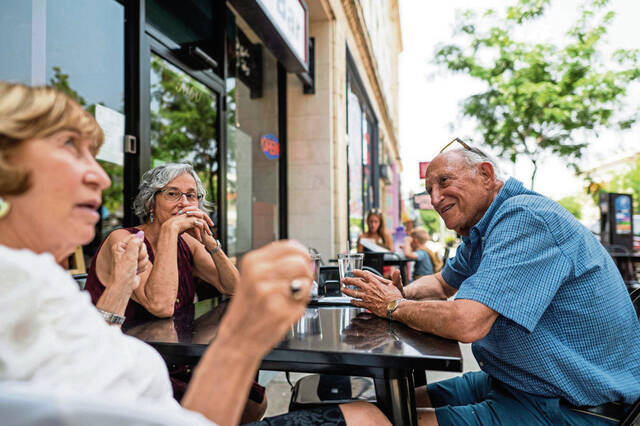https://development.triblive.com/local/squirrel-hill-holds-complicated-feelings-about-death-penalty-for-synagogue-shooter/
Squirrel Hill holds complicated feelings about death penalty for synagogue shooter

Many in Squirrel Hill hate Pittsburgh synagogue shooter Robert Bowers. But their feelings about how to punish him as his federal trial nears a conclusion are as unique as the individuals themselves.
Lori Kline grew up in this tree-shaded East End neighborhood, where roughly half the residents are Jewish and numerous synagogues are based. Her brothers had their bar mitzvahs, a Jewish rite of passage, at Tree of Life-Or L’Simcha — the same synagogue Bowers attacked, killing 11 congregants, on Oct. 27, 2018.
“The main sanctuary, this is a place you can come to be safe and to be with your community — I remember saying to a friend of mine: ‘There’s nowhere safe,’” said Kline, 58, of Austin, Texas, eating lunch in the shade on a sweltering July afternoon at The Ramen Bar on Squirrel Hill’s Forbes Avenue.
“There are people who want the death penalty (for Bowers), and there are people who don’t,” Kline said. “And they’re both reasonable.”
“I don’t believe in the death penalty,” interjected Kline’s stepmother, Judy Sales, 78, of Oakmont, “except for him.”
Sales’ opinion was commonly held last week in Squirrel Hill by the people who spoke with the Tribune-Review, as the long-anticipated Bowers trial ground into its eighth week in a federal courtroom in Downtown Pittsburgh.
Bowers, 50, of Baldwin has been found guilty of 63 counts against him for killing 11 worshippers at the Squirrel Hill synagogue, a boxy, beige edifice that sits at the intersection of Shady and Wilkins avenues. The metal fence erected around the synagogue after the shooting still stands, a reminder of the massacre’s enduring legacy.
The jury found Bowers eligible for the death penalty and now is listening to evidence in the final, sentence-selection phase of the trial.
The victims were Rose Mallinger, 97; Bernice Simon, 84, and her husband, Sylvan Simon, 86; brothers David Rosenthal, 54, and Cecil Rosenthal, 59; Dan Stein, 71; Irving Younger, 69; Dr. Jerry Rabinowitz, 66; Joyce Fienberg, 75; Melvin Wax, 87; and Richard Gottfried, 65.
They were members of the Tree of Life-Or L’Simcha, Dor Hadash and New Light congregations.
‘You’re reminded of it every day’
David Feldstein’s bagel shop, like many Squirrel Hill businesses, feels inextricably linked to the crime that redefined its neighborhood.
Many of the synagogue shooting’s victims — Feldstein estimates about nine of the 11 killed — ate pretty regularly at The Bagel Factory, which Feldstein has owned for 35 years.
The Rosenthal “boys” loved to hang out there, he said. Even after the tragedy, families of the victims frequent the business.
Feldstein can’t escape the specter of the shooting.
“Driving by Tree of Life every morning, it just reminds you of it,” said Feldstein, 55, of Shadyside, sweating as he hustled between grabbing orders and working the shop’s cash register. “You’re reminded of it every day.”
Feldstein remembers the morning of the shooting. It was a Saturday; the place was busy. Customers mingled with Zone 4 police officers, whose station sits a couple blocks away and who often set up shop there.
“Then the police just jumped up,” Feldstein said. “We had no idea — all of a sudden, they just ran out of here.”
“Within 10 minutes, there were police cars on sidewalks,” he added. “There was a continuous flow of police. And the phone calls? They didn’t stop.”
Feldstein, a Jew who grew up in nearby Point Breeze, has been following the media’s trial coverage. But he doesn’t know whether Bowers should face life in prison without parole or pay for his crimes with his life.
Two kinds of justice
Al Duerig has played the violin for more than 50 years.
He recently started coming to Squirrel Hill to busk for change as a street musician.
Last week, the Westmoreland County native — clad in a red, short-sleeved shirt and shorts — feverishly played parts of Vivaldi’s “Four Seasons” for passersby in the parking garage for the Jewish Community Center of Greater Pittsburgh.
Duerig, who is not Jewish, set up there and played in the opened trunk of his red Toyota Prius because he likes the garage’s acoustics. As temperatures crept into the 90s, the abundant shade helped, too.
On Oct. 27, 2018, families packed into the same JCC to convene with police and the FBI. They desperately waited for word on whether their loved ones were injured or killed.
Some waited eight, nine, 10 hours.
The memory of that day — and the JCC’s place in it — resonated last week for Duerig, who has been watching Bowers’ trial unfold.
“‘The score is 11-1,’” Duerig said he had read Bowers had said. “He wanted more victims.”
Duerig seemed to be content with either possible outcome: life or death for Bowers.
“I think either way, he’s cooked,” said Duerig, 70, of Delmont. “And that’s good enough for me.”
Complex feelings
Eric Ackland, the owner of a popular Squirrel Hill bookstore, admits it’s tough to gauge an entire neighborhood’s reaction to a trial.
“Two Jews, three opinions,” laughed Ackland, 51, of Greenfield.
Those who frequent Amazing Books don’t talk often, at least in the store, about the Bowers trial, said Ackland, a member of the Bnai Emunoh Chabad synagogue who wears a yarmulke every day. He still dutifully follows trial developments.
The biggest question remaining is over the death penalty, which prosecutors are working to persuade jurors to select as a sentence, he said.
Ackland admits his feelings about it are complex.
“If it is without a doubt proven that someone has done something horrific … I don’t really have a problem with it,” said Ackland, speaking carefully as he let out each word.
“But I know it has been misapplied,” he added. “I know innocent men and women have died at the hands of the state. And that’s awful.”
‘He had it all planned’
Next to the post office on heavily trafficked Murray Avenue, a pair of missionaries have preached and distributed literature three times a week, every week, since the 2018 shooting.
They call themselves Jews — fitting for a neighborhood often called the center of Jewish life in Pittsburgh.
But affiliations are a little more complicated than that.
Mitch Tepper, a Brooklyn man who today lives in Butler County, identifies as Jewish. But he also believes Jesus Christ was “Yeshua,” or the Messiah.
A missionary with the group Christian Witnesses to Israel, Tepper said he was hired to hand out “City Bibles,” a collection of Old Testament prophecies and New Testament teachings, and give snacks and water to people who need them.
“I have a heart for Squirrel Hill,” said Tepper, 68, of Butler. “What happened here five years ago has changed both our lives.”
Tepper proselytizes alongside Nathan Puro, who moved from Westchester, N.Y., to Pittsburgh in 1975 to join what he called “the Messianic movement.” Puro’s business card lists him as an “emissary” for the group Tikkun, which is based in Grand Prairie, Texas.
“No one can take our corner away from us,” laughed Puro, 67, of North Huntingdon, Westmoreland County.
Tepper said the synagogue shooting and its repercussions remain pervasive in the neighborhood. Tepper proudly described — as if meeting a Hollywood celebrity — interacting with families of the 11 victims.
When people engage him in conversation, political or otherwise, Tepper stresses forgiveness. He’d like to see Bowers go to prison and repent for his crimes.
“I know the Old Testament and Torah enough, and I know the death penalty is a just punishment,” Tepper said. “But you’ve got to have a big heart in this world.”
Andrew Neil disagrees.
The Castle Shannon man, who goes to Jewish services in Greenfield, sat in Dunkin’ on Shady Avenue last Wednesday and said he thinks Bowers needs to pay for the shooting. Neil was upset with Bowers’ defense team for portraying the shooter as a mentally ill man incapable of the intent behind the crime.
“You kill 11 people … then you’re going to tell people you’re crazy? He had it all planned!” said Neil, 49. “You commit a crime, you need to be punished for it. Me? I think he should get the death penalty.”
Talking about it
Therapists have been busy this summer at 10.27 Healing Partnership.
The nonprofit group, based in the JCC building, says it provides “support, connection and opportunities for reflection” for those impacted by the shooting. Their reach, though, is broad, and workers there aim to help anyone who has experienced hate-induced trauma.
The organization has been hearing from more and more people rattled by the trial since it started earlier this year, said Maggie Feinstein, the group’s director, a professional counselor, a Squirrel Hill resident and a mother of two children.
“We see more people now wanting to talk about it,” Feinstein said. “Some people are looking for a sounding board. … It’s very reasonable for people to feel trauma related to the event, even if they weren’t involved.”
Volunteer therapists staff 10.27 Healing Partnership for two to three hours every day, five days a week, Feinstein said. The group even offers what they call “drop-in counseling.”
What should somebody do if they’re reading the newspaper and getting upset by details revealed by Bowers’ trial?
“The recommendation is to definitely talk about it,” Feinstein said. “Connection is absolutely the best thing.”
Feinstein said Pittsburgh residents “may be surprised by what bothers them and what doesn’t bother them” about the trial coverage. It’s important to work through those feelings.
“It’s the thing that catches you by surprise that is more likely to have an impact on you,” she said. “The reason you want people talking is it reduces the chance that they hide something in shame.”
Drop-in counseling through the partnership is free, the group said. No insurance or appointment is required.
Going backward
Before retiring to Oakmont, Arthur Sales raised his family in Squirrel Hill.
He attended services at the Tree of Life-Or L’Simcha synagogue. When he tied the knot with Judy on June 6, 1987 — then in his 50s — Sales got married in his home synagogue.
Sales, 80, remembered grappling with antisemitism when living in Pittsburgh’s East End in the 1940s and ’50s. It became a familiar fixture of growing up Jewish in an American city.
Things got better for Jews in Pittsburgh in the ’60s, ’70s and ’80s, he said.
But Sales has been shocked by the spike in antisemitism in recent years. The synagogue shooting in 2018 was punctuation on a sentence, a troubling landmark for the trend.
“You think, ‘This is history, this is gone,’ but we’re back in the 1940s and ’50s again,” Sales said. “We’ve evolved to the point where we think, ‘This doesn’t happen anymore.’
“But it happens. It happens every day. You want to make America great again? There was a period (when) I thought we were really evolved into something special. And we (threw) it away.”
Copyright ©2026— Trib Total Media, LLC (TribLIVE.com)
